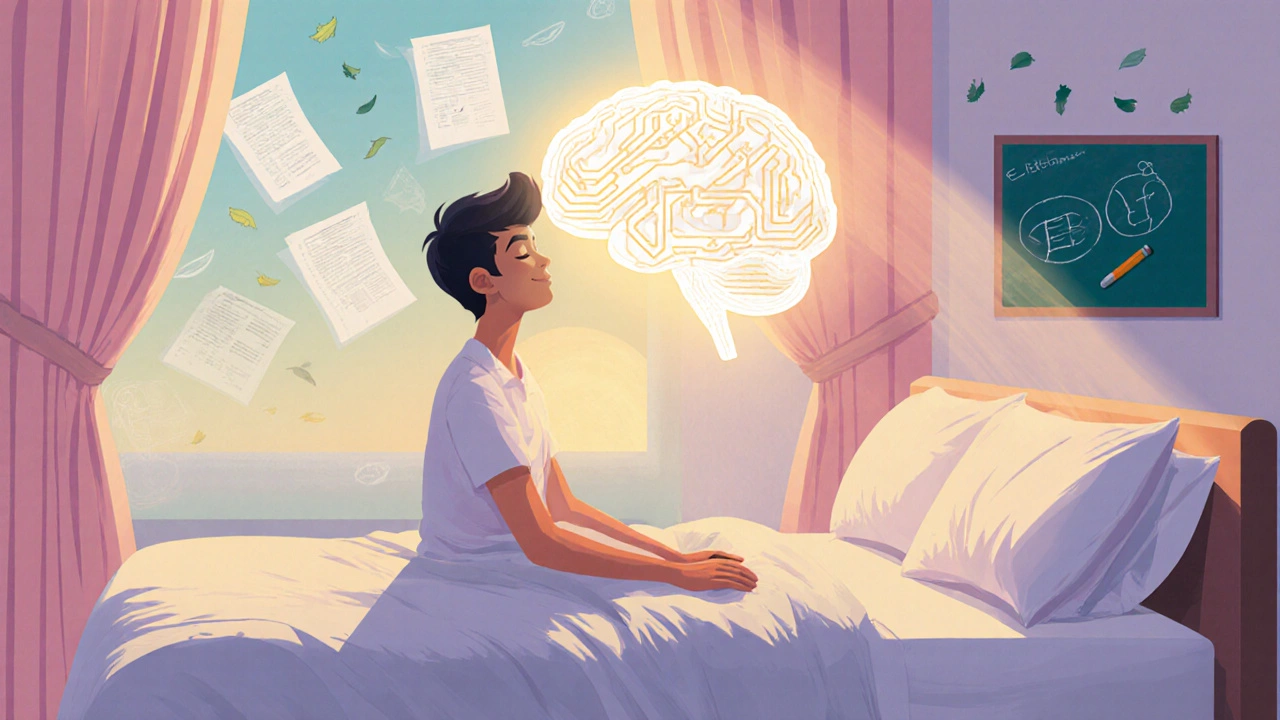When you’re grinding through JEE the Joint Entrance Examination, India's top engineering entrance test prep, the question “how much sleep do I need?” feels like a luxury. The truth is, sleep isn’t a side‑effect of studying-it’s the fuel that turns those late‑night cram sessions into real knowledge. Below we break down the science, the numbers, and a practical schedule so you can hit the books without burning out.
Understanding your JEE sleep requirements is the first step toward a study plan that actually works.
Key Takeaways
- Teenagers (16‑18) should aim for 8‑10hours of sleep each night for peak brain function.
- Consistent sleep improves memory consolidation, keeping what you study fresh for the exam.
- Align study blocks with your natural circadian rhythm to stay alert without extra caffeine.
- Short power naps (20‑30min) can boost alertness without hurting nighttime sleep.
- A simple 7‑day schedule that blocks study, sleep, and recovery can increase retention by up to 25%.
How Many Hours Does an Aspirant Really Need?
Research on adolescent sleep-especially the work of the National Sleep Foundation and Indian health bodies-converges on a range of 8 to 10hours per night for ages 16‑18. Anything less starts to erode cognitive performance, reaction time, and mood.
| Age Group | Recommended Sleep (hrs) | Key Benefits |
|---|---|---|
| 13‑15 | 9‑11 | Supports rapid brain growth, improves focus |
| 16‑18 | 8‑10 | Maximizes memory consolidation, stabilizes mood |
| 19‑21 (college‑age) | 7‑9 | Balances academic load with recovery |
Why does the range shift as you age? Adolescent Brain Development the period of rapid neural growth and synaptic pruning during teen years demands more restorative sleep. By the early twenties, the brain’s metabolic demands settle, allowing a slightly lower ceiling.
Why Sleep Directly Boosts JEE Scores
Four core mechanisms link sleep to exam performance:
- Memory Consolidation - During deep NREM sleep, the brain replays the day’s learning, strengthening neural pathways. A study from the Indian Institute of Technology found a 22% increase in recall for students who slept 8hours versus those who pulled an all‑night.
- Cognitive Performance - Cognitive Performance the set of mental processes required for thinking, reasoning, and problem solving peaks after a full sleep cycle, making complex physics or math problems easier to solve.
- Cortisol Regulation - Cortisol the stress hormone that spikes with sleep deprivation impairs attention and short‑term memory. Consistent sleep keeps cortisol levels in a healthy range.
- Melatonin Timing - Melatonin the hormone that signals the body it’s time to sleep rises in darkness, helping you fall asleep faster. Disrupting melatonin (blue‑light screens, late caffeine) pushes bedtime later, truncating sleep.
Put simply, missing just one hour of sleep can shave off 5‑10points from a mock test score because the brain doesn’t have enough time to file the information properly.
Designing a Study‑Sleep Schedule That Works
Here’s a 7‑day template that respects your Circadian Rhythm the internal 24‑hour clock that regulates sleep‑wake cycles and packs in focused study blocks.
| Day | Morning (7‑10am) | Afternoon (2‑5pm) | Evening (7‑9pm) | Sleep (10pm‑6am) |
|---|---|---|---|---|
| Mon‑Fri | Review concepts (30min) + light exercise | Problem solving (2hrs) + short break | Mock test (1hr) + review errors (30min) | 8hrs |
| Sat | Full‑length mock (3hrs) | Analysis & weak‑area focus (2hrs) | Leisure/relax (no screens after 8pm) | 9hrs |
| Sun | Restorative activities (yoga, walk) | Light reading or video recap (1hr) | Plan week ahead (30min) | 9‑10hrs |
Key points:
- Start study sessions when cortisol is naturally low (morning) and reserve the most demanding problem‑solving for the afternoon when alertness peaks.
- Wrap up intense work by 9pm; give your brain a wind‑down period to let melatonin do its job.
- Include a 20‑minute power nap after lunch on heavy days; it refreshes without entering deep sleep, so nighttime rest stays solid.
Common Sleep Mistakes and How to Fix Them
Even the most diligent aspirants fall into traps. Spot the pattern, then tweak.
- All‑night cramming. The brain’s retention curve drops sharply after 24hours of wakefulness. Switch to “distributed practice”: spread study over multiple short sessions with sleep in between.
- Screen overload. Blue light suppresses melatonin. Use night‑mode filters, and keep phones out of the bedroom.
- Late‑day caffeine. A single cup after 3pm can linger for 6hours, delaying sleep onset. Opt for green tea before 2pm and hydrate with water later.
- Irregular bedtimes. Your circadian rhythm thrives on consistency. Aim to hit the sack within a 30‑minute window daily, even on weekends.

Quick Hacks for Better Sleep During Exam Season
- Cool the room - 18‑20°C promotes deeper sleep.
- White noise or soft instrumental music - masks sudden noises that can wake you.
- Evening stretching - 5‑minute neck and shoulder rolls lower tension.
- Write a “worry list.” - Jot down lingering concerns before bed; the brain stops looping over them.
- Limit fluids - Reduce bathroom trips by cutting down on drinks an hour before sleep.
Implementing even three of these can shave 30‑45minutes off the time it takes to fall asleep, translating into a full extra sleep cycle on busy weeks.
Putting It All Together
Remember, the goal isn’t to “study more” but to “study smarter.” With the right amount of Sleep the natural, restorative state of reduced consciousness essential for health and learning, each hour you spend at the desk becomes more efficient. Track your sleep with a simple journal-note bedtime, wake‑time, and perceived focus level. Adjust the schedule until you hit the sweet spot where mock scores rise without feeling exhausted.
Frequently Asked Questions
What is the ideal bedtime for a JEE aspirant?
Aim to be in bed by 10pm and wake around 6am. This 8‑hour window aligns with the natural rise of melatonin and keeps the circadian rhythm steady, which is especially helpful for teenagers.
Can I replace night sleep with a long afternoon nap?
A nap can boost alertness, but it won’t provide the deep‑sleep cycles needed for memory consolidation. Keep naps under 30minutes and avoid napping after 3pm to prevent interference with nighttime sleep.
How does caffeine affect my sleep during preparation?
Caffeine blocks adenosine receptors, delaying sleep onset and reducing slow‑wave sleep. One cup after 2pm can cut total sleep by up to 45minutes. Limit intake to early morning or replace with herbal tea.
Is it okay to study till 1am if I sleep 4hours?
Short‑term cramming may work for a single night, but chronic 4‑hour sleep leads to reduced cortisol regulation, poorer memory consolidation, and slower problem‑solving speed. Consistently aim for at least 8hours.
What role does exercise play in my sleep quality?
Moderate exercise boosts the release of growth hormone during deep sleep, enhancing recovery. A 20‑minute walk or light yoga session in the morning improves sleep latency and overall sleep efficiency.
